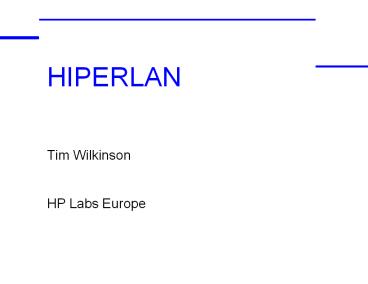HIPERLAN - PowerPoint PPT Presentation
Title:
HIPERLAN
Description:
Support isochronous traffic. audio 32kbps, 10ns latency. video 2Mbps, 100ns latency ... Either best effort latency for isochronous traffic ... – PowerPoint PPT presentation
Number of Views:530
Avg rating:3.0/5.0
Title: HIPERLAN
1
HIPERLAN
- Tim Wilkinson
- HP Labs Europe
2
What is HIPERLAN?
- HIPERLAN - HIgh PErformance Radio LAN
- HIPERLAN is a new standard for Radio LANs
developed in Europe by ETSI - HIPERLAN is an interoperability standard which
specifies a common air interface MAC and PHY
layers in OSI model - HIPERLAN will be a family of standards
- HIPERLAN 1 is described in detail
3
HIPERLAN - reference model
4
Early wireless LANs operating in theISM bands
(900MHz and 2.45GHz)Low data rate (1Mbps) - an
indirect result of the FCC spread spectrum rules
part 15.247Severe interference environment -
from unlike wireless LANs and other ISM band
systemsLack of standards - IEEE 802.11 was
initiated to satisfy this need but it was taking
time to develop ETSI set up RES10 to develop a
standard that would be equal in performanceto
wired LANs such as Ethernet
- Origins of HIPERLAN
5
HIPERLAN 1 - history
- ETSI set up RES10 group - mid 1991
- RES10 start work on standard - early 1992
- CEPT allocate spectrum - early 1993
- RES10 complete draft standard - mid 1995
- ETSI publish final standard - late 1995
- RES10 start work on type approval - early 1996
- HIPERLAN passes public enquiry - mid 1996
6
HIPERLAN 1 - spectrum
- CEPT identified vacant spectrum at 5GHz
- 5.00-5.25GHz was allocated worldwideto aviation
authorities on a primary basis for MLS but only
5.00-5.15GHz was used - CEPT allocated 5.15-5.25GHz to HIPERLAN on a
secondary basis with its status as
non-interference, non-protected - An extension of the band from 5.25-5.3GHz is
available in most countries
7
HIPERLAN - applications
- Early ideas
with infrastructure
without infrastructure
Others include - many vertical applications,
wireless docking,public access to the NII, home
networks
8
Short range - 50mLow mobility - 1.4m/sNetworks
with and without infrastructureSupport
isochronous trafficaudio 32kbps, 10ns
latencyvideo 2Mbps, 100ns latencySupport
asynchronous trafficdata 10Mbps, immediate access
- HIPERLAN 1 - requirements
9
High transmission rate - 23.5294MbpsModulation -
non diff GMSK, BT 0.3Error control - FEC,
BCH(31,26)Packet failure rate - 0.01 (4160 data
bits)Low transmission rate - 1.470588MbpsModulat
ion - FSK, freq dev 368kHzChannelisation - 5
channels, 5.15-5.30GHzTransmit power - 10,
20, 30dBmReceive sensitivity - -50, -60, -70dBm
- HIPERLAN 1 PHY - specifications
10
HIPERLAN 1 PHY - packets
DATA PACKET
HIGH RATE 23.5Mbps
LOW RATE 1.5Mbps
LOW RATE HEADER 35bits (560bits)
- SYNCH SEQUENCE
- 450bits
DATA BLOCK 496 bits
DATA BLOCK496bits
MAC HEADER
1-47 BLOCKS
ACK PACKET
LOW RATE 1.5Mbps
LOW RATE ACK 23bits (368bits)
NO MAC HEADER IMMEDIATE TRANS
11
HIPERLAN 1 - modem options
- complexity
performance
floor
room
docking
12
A HIPERLAN can only use one ChannelThere is no
mechanism for changing channelAntenna diversity
an option but...Must use same antenna for
CCAand transmission for correct MAC
functionMust reduce transmit power by antenna
gainto maintain EIRP as specified by CEPTPower
saving with...Low rate header for modem power
savingPower saving cycle strategies sleep/wake
modes
- HIPERLAN 1 PHY - quirks
13
Fully distributed MACNetworks with and without
infrastructurePermits multi-hop relaying via
neighboursBased on LBT - uses CCAwith adaptive
threshold EY-NPMA - Elimination Yield
Non-pre-emptive Multiple AccessPrioritiy
assertion using listen-talkContention resolution
using talk-listenImmediate packet acknowledgment
- HIPERLAN 1 MAC - concept
14
HIPERLAN 1 MAC - hidden nodes
communicationrange
rx
tx
- tx
MAC avoids this
sense/interferencerange
15
HIPERLAN 1 MAC - function
16
Prioritisation1-5 slots of 168bits
(talk)ContentionElimination - 0-12 slots of
212bits (talk),1 slot of 256bits (listen),
prob(talk-listen) 0.5Yield - 0-9 slots of
168bits (listen), prob(n) 0.1Tx to Rx turn
around time 6?s256 contenders, 3.5 collision
probabilityTotal of 0-5152bits (0-219?s) MAC
header
- HIPERLAN 1 MAC - phase
17
Priority is a function of lifetime and user
priority
- HIPERLAN 1 MAC - priority
NORMALISEDRESIDUAL LIFETIME
HIGH USERDEFINED PRIORITY
LOW USERDEFINED PRIORITY
NRL lt 10ms
0
1
10ms lt NRLlt 20ms
1
2
20ms lt NRL lt 40ms
2
3
40ms lt NRL lt 80ms
3
4
NRL gt 80ms
4
4
If lifetime expires packet is discarded in the
MAC Either best effort latency for isochronous
traffic Or best effort integrity for asynchronous
traffic
18
Simulations show that the HIPERLAN MAC can
simultaneuosly support25 audio links _at_ 32kbit/s,
10ms delivery 25 audio links _at_ 16kbit/s, 20ms
delivery1 video link _at_ 2Mbit/s, 100ms
deliveryAsynch file transfer _at_ 13.4Mbit/s
- HIPERLAN 1 MAC - performance
19
Two European collaborative projectsLAURA - not
fully standards compliantDemonstrated some
conceptsNo ASICs developedHIPERION - fully
standards compliantASICs designed for...RF MCM
with GaAs and Si by GPSModem, Codec, D/A, A/D by
AppleMAC controller by ARM
- HIPERLAN 1 - testbeds
20
HIPERLAN 2 - WATM
- Idea is to be compatible with ATM
- Support QoS guarantees
- Efficiently handle ATM cells
- Requires additional spectrum in Europe
- Sharing rules under development by WINForum for
NII/SUPERNET bandin the US aim to support - HIPERLAN 1 and HIPERLAN 2
- This effort involves interaction between
- ETSI RES10, WINForum, ATM Forum
21
HIPERLAN family (ETSI RES10)
22
HIPERLAN vision (ETSI RES10)































